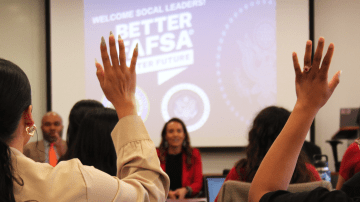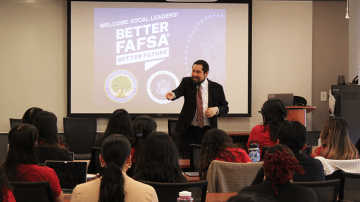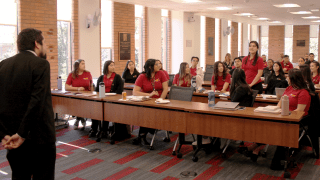Following the March to late-April admissions letters, the next step for many college hopefuls is securing funding to support their educational goals; many apply to the Free Application for Federal Student Aid (FAFSA). The FAFSA system has faced challenges that include the complex and time-consuming nature of the application process. Students and families struggle to navigate the intricate requirements and deadlines, leading to confusion and potential errors in their applications. The latest FAFSA rollout has left many applicants and families frustrated and concerned about college financial award letter delays and possibly unable to make enrollment decision deadlines.

On March 29, over 20 USC College Advising Corps (USC CAC) advisers and other direct service providers were invited by the White House U.S. Department of Education to join an in-person listening session to provide feedback on the FAFSA process. Emmanuel Caudillo, senior adviser with the White House Initiative on Advancing Educational Equity, Excellence and Economic for Hispanics, led the session titled Better FAFSA, Better Future. He was joined by two staff members Mariana Martinez and Michael Gardner, who represent the Federal Student Aid, an office of the U.S. Department of Education.
USC CAC works with Los Angeles-based high school students to navigate and streamline the FAFSA process. Their goal is to provide guidance and support to applicants to help alleviate these challenges and ensure that more students receive the financial aid they need to pursue their education. Over 10,000 students are provided college advising services each year through USC CAC. During the 2022–23 academic year, 43 advisers met with over 11,000 students.

According to Caudillo, the Department of Education has been doing outreach around the country and listening to college and community leaders about the FAFSA form and process to address concerns. “You’re doing an incredible job … you are gaining this information just as we’re trying to fill this out,” Caudillo said to USC CAC advisers during the session. “We appreciate all the work that you’re doing to help ensure our students are able to realize their dreams of attending college and not having to worry about the financial barriers that are there.” Topics discussed during the session with USC CAC advisers included suggestions for improvement on the parent verification process, multilingual forms, helplines that accommodate different time zones, creation of a parent dashboard and less confusing terminology.
Arielle McPherson, a first-year USC CAC adviser at Long Beach Polytechnic High School, serves 879 seniors. “It was very refreshing to have people invested in listening to our conversations and taking note of all the concerns that we have, and any solutions that we came up with that make this process smoother for seniors.”
Jessica Garcia, a second-year USC CAC adviser at Wilson High School in Long Beach, works with 815 seniors. “While [the new FAFSA process] may be a barrier now, it really is to improve and make sure that more students can go to college and increase that accessibility and increase that equity with education.” She feels confident returning to her students and letting them know that college is still an option. My message to students is that it is still accessible and don’t lose hope,” she added.
“The Department of Education really does care about hearing those voices on the frontlines,” said Mariah Jacobo, USC CAC program coordinator. Jacobo is currently pursuing an advanced degree at USC Rossier’s Master of Education in Postsecondary Administration and Student Affairs (PASA). “They want to hear from our college advisers helping the students achieve their goals. It’s heartwarming and validating that the work we do is extremely important.”




